Qt Signals Slots Threads
Dear Qt Forum, currently I am developing a hobby project with Qt and wanted to use signals and slots across threads (without QThread inheritance). Sorry for bringing up this topic again, but I am a bit stuck to create signals and slots across threads with. Signals and Slots Contd.Qt supports four types of signal-slot connections:With direct connections, the slot gets called immediately when the signal is emitted. The slot is executed in the thread that emitted the signal (which is not necessarily the thread where the receiver object lives).With queued connections, the slot is. The mobile casino has taken the concept of personalized gaming Qt Signals And Slots Thread Safe to a whole new level. Qt Signals And Slots Thread Safe Now you can play on the go 24×7 regardless of where you are. All you need is a smartphone that gives you Internet access via 3G, 4G, LTE, or Wi-Fi.
Qt Signals Slots Threads Casino Game
published at 20.08.2015 15:28 by Jens Weller
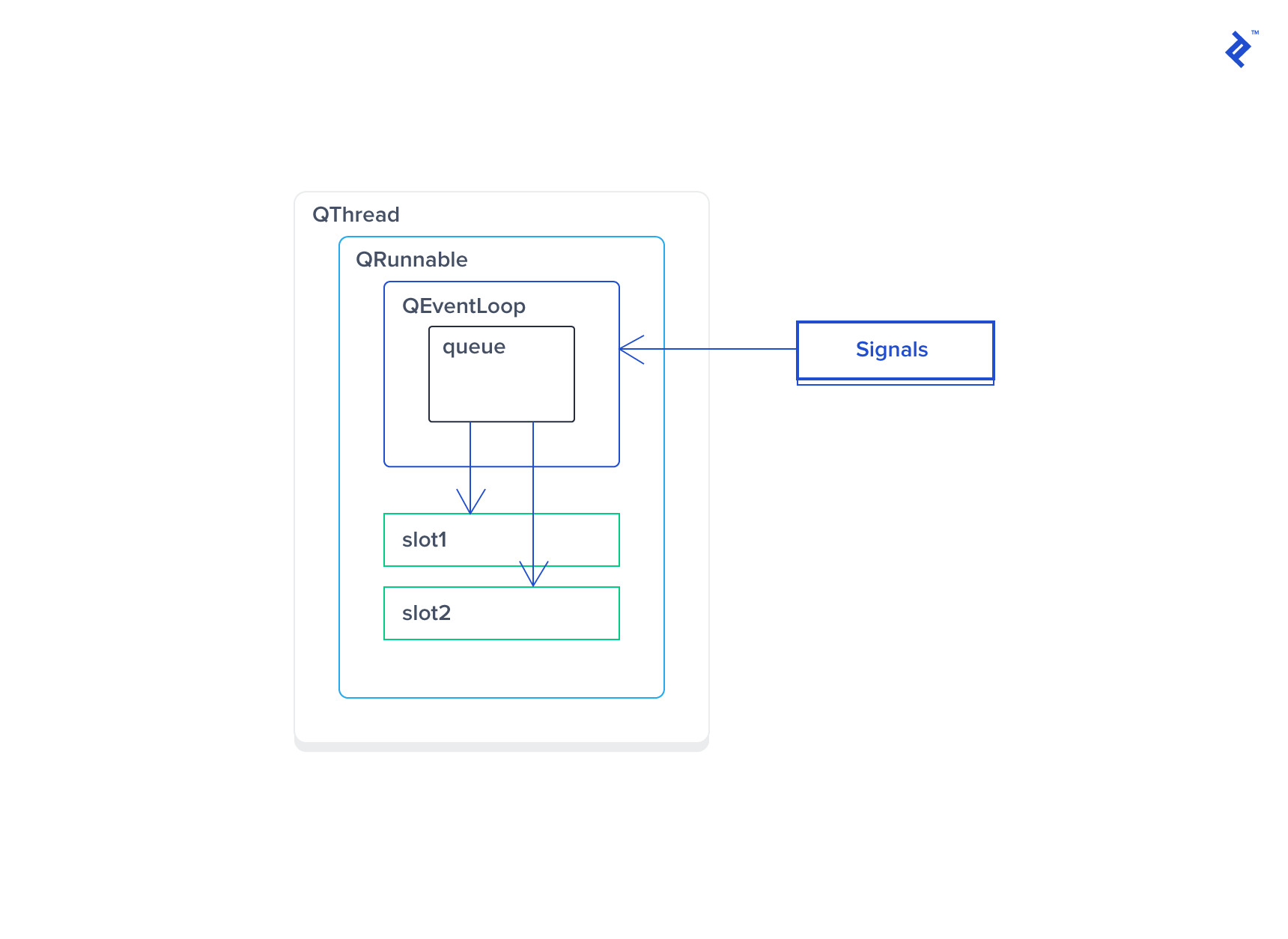
This is the 7th blog post in my series about writing applications with C++ using Qt and boost. This time it is about how to notify one part of our application that something has happened somewhere else. I will start with Qt, as it brings with signals and slots a mechanism to do exactly that. But, as I have the goal not to use Qt mainly in the UI Layer, I will also look on how to notify other parts of the application, when things are changing. The last episode was about QWidgets and data.
The video for this episode:
Signals and Events in Qt
But lets start with Qt. Qt offers two different systems for our needs, Qt signal/slot and QEvents. While Qt signal/slot is the moc driven signaling system of Qt (which you can connect to via QObject::connect), there is a second Event interface informing you about certain system-like events, such as QMouseEvent, QKeyEvent or QFocusEvent. Usually you have to overwrite a method to receive such events, or use an event filter, like I showed in my last post for QFocusEvents. Some classes translate QEvents to signals, such as the TreeView, which has a signal for displaying context menus. But as this blog post is more on signaling then system events...
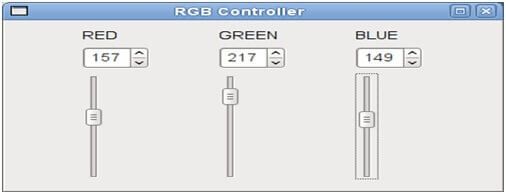
Qt has had its own signaling mechanism for a long time now, so when you use Qt, you also will use QSignals. Qt also uses its own keywords for this: signals, slots and emit. There is an option to turn this of, and use the macros Q_SIGNAL/S,Q_SLOT/S and Q_EMIT instead: CONFIG += no_keywords. This allows to use 3rd party libraries which use these terms, e.g. boost::signal. Qt signal/slot implementation is thread safe, so that you can use it to send messages between different QThreads, this is especially important, as anything UI related should run in the main thread of Qt, anything that could block your UI should not run in this thread, so running jobs in a QThreadPool and emitting the finished result as a signal is a common pattern. Maybe I will touch this in a later post...
For now, lets see the basics of using signals and slots in Qt. This is the code from my MainWindow class constructor, connecting several signals to slots:
So, the traditional, moc driven connect method is QObject* derived sender, the SIGNAL macro defining the signal to connect to, followed by the QObject* derived receiver, then SLOT(...) is the last argument, naming the slot to connect to. There is a fifth defaultet parameter: the ConnectionType. The last line contains the new, lambda based connection option, where you again have the sender and its slot, this time as a method-pointer, and then followed by a lambda acting as the receiving slot.
This syntax can lead to a rare error, when ever a signal is overloaded, like QComboBox::currentIndexChanged, which is available with an int or QString parameter. Then you'll need an ugly static_cast to tell the compiler which version you'd like:
In this case I didn't even needed the argument from the slot. It is fairly easy to use your own signals and slots, all you need is a QObject derived class, which is processed by the moc. Mostly of course you already have classes derived from QObject indirectly, which then use signals and slots, like the page panel class:
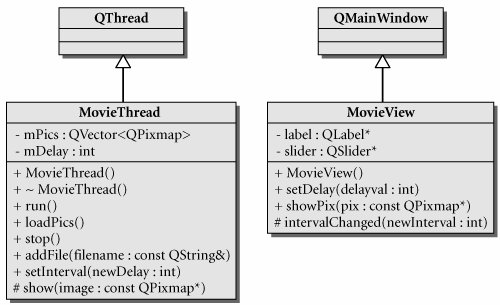
So, slots and signals are normal member functions, declared after the qt-specific keyword signals/slots. When you want to emit a signal, its enough to just write 'emit my_signal();', and all observers on this signal will get notified. Slots are often used to react to certain events in the UI, like the currentIndexChanged signal in this case. In the widget editor of QtCreator you get an overview of available signals when right clicking and selecting 'go to slot...', this will create a slot for this signal in your QWidget derived class.
There is also the option to map certain widgets to certain values when a signal fires, this is done via QSignalMapper. I use this in a different program to have one widget for editing flag like settings, where each flag is a bit in a settings value:
The constructor only takes a QStringList for the option names, and an int for how many columns of check boxes the current use case should have. The QSignalMapper is a member variable, and each QCheckBox connects its clicked signal to the map() slot of QSignalMapper. With setMapping the connection between the sender and the value is set up. QSignalMapper offers int, QObject*, QWidget* and QString as mapping values. QVariant or a generic interface is not provided by Qt. In the clicked slot I simply toggle the bit for the corresponding flag.
When working in Qt, most of it types provide support for signals and slots through deriving from QObject, which offers connect/disconnect methods to manage your slot connections. This brings again the disadvantages of QObject and the moc, as templates can't be used in this context, all classes using signal/slot must be concrete classes. Deriving your classes from templates (CRTP e.g.) can help here to mix in a generic layer.
Qt Signal Slot Thread Performance
While Qt is fairly well prepared to manage its own messaging needs, what alternatives exist, that could be used in the non Qt related code? The C++ standard offers currently only std::function, which can be used to implement a callback mechanism. But this has its limitations, of a 1:1 or 1:many connection this is a viable option. I use it to notify my MainWindow class that a node in the tree has changed its name. Also its useful to implement classes which execute a callback in a certain context, like EventFilter in the last blog post in this series. But std::function is not an implementation of the observer pattern, and implementing your own with it would be reinventing the wheel. Boost has had for a long time a signal library, which now is available as version 2: boost::signals2.
Using boost::signals2
Honestly, if I could avoid using signals2, I would, as it has one certain disadvantage: build times increase. So far my project is kind of small, has only a few classes, which most of are less then 100 loc. Adding boost::signals2 to a class makes it hard to build a project quickly for debugging or just seeing if the work of the past hour still compiles.
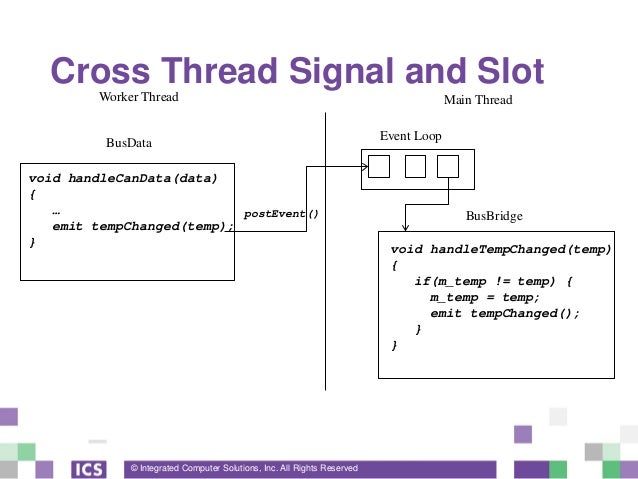
The need for signals2 came in my application, when I began to understand, that there are some events, which go from the Qt layer into the boost/standard C++ layer, and then need to travel back into the Qt layer. Each Page has a shared_ptr to a layout object, which is part of a LayoutItem holding the list of layouts for a document. There is one LayoutPanel to edit, create and delete layouts in LayoutItem, and each PagePanel has a QComboBox, so that the user can select the layout for the page. Now, when a user creates/renames a layout, each PagePanel needs to be notified, but when it gets deleted, also page needs to change. This could be implemented in the Qt layer, each Qt class involved has access to the boost/C++ layer, and can make the necessary changes. But then, this important business logic of removing a layout will only work through the UI. When I use boost::signals2, it can be done in the boost/standard C++ layer.
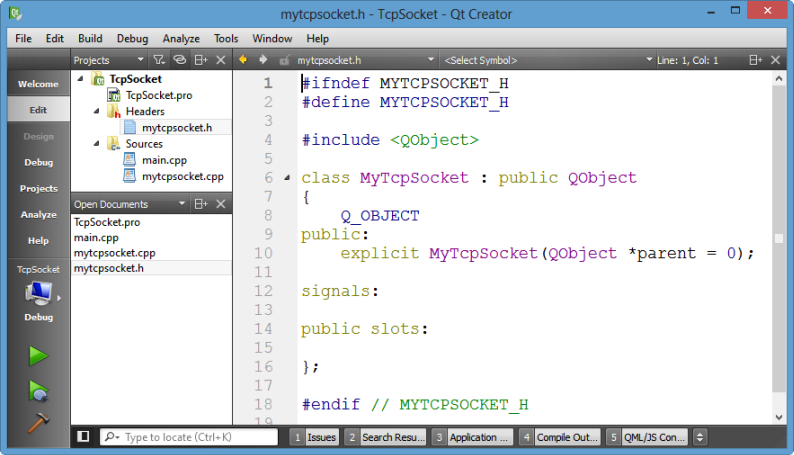
boost::signals2 has a signal template, which has the signature as the argument, this signal type also then has the typedef for the slot type, signal::connect returns a connection object:
When ever an object subscribes to the layout signals, it must to so for all three, the vector should invoke RVO. Currently, PagePanel is the only subscriber, it simply connects to the signals using boost::bind:
One detail here is, that I do use scoped_connection, which will call disconnect() on its destruction, while the default boost::signals2::connection class does not. scoped_connection can be moved, but not copied. But once it is in the vector, it will stay there. Also, you should forward declare the connection classes, so that you don't have to include the boost/signals2.hpp headers, this prevents leaking into other sources.
But boost::signals2 can do far more. I have no use for code that depends on the order of slots called, but you can specify this with signal::contect(int group, slot):
In some context it is interesting to handle the return value of a signal, for this boost::signal2 offers a combiner, which is the second template parameter to signal: signal<float(float,float), aggregate_combiner<std::vector<float> > >. This combiner then also overwrites the return value of the signal, which is now std::vector instead of float. Another feature is that you can block a connection with shared_connection_block.
boost::signal2 is currently header only, thread safe and offers a few more customization points, for example you can change the mutex, but also the signature type, which currently is boost::function.
Alternatives to boost::signals2
If you know very well what you are doing, you could use boost::signal instead of its new version, signals2. This might improve your compile times, but boost::signals is not any more maintained. Also, while signals2 is header-only, signals is not. The thread safety is a key feature of signals2, which at some time sooner or later will come into play in your code base. I don't want to introduce a 3rd party library into my project just to have signaling/observer pattern, but you should know, that there are a few alternatives (I googled that too):
- libsigslot
- has open bugs from 2003 - 2011, memory leaks and other issues. But seems to do the job.
- libsigc++
- a standard C++ implementation, inspired by Qt, you (might) have to derive your objects from a base class. Virtual function calls are the base of this library it seems, at least for method slots, which the call has to be derived from sigc::trackable.
- gtkmm and glibmm seem to use this for their signaling needs.
- the 5 open bugs seem to be feature requests mostly (and nil is a keyword in Object-C, well...)
- the library has been rewritten using modern C++ idioms (claims the site)
- This codeproject article from 2005 gives some insights, but C++11 changes some of them I think.
- slimsig
- seems to be a header only alternative to boost::signals2
- 2 open bugs, no change in one year
- boost::synapse
- this library is proposed for boost, but has not yet been reviewed.
- I think it could be a more lightweight alternative to signals2
- Currently its not threadsafe.
The only disadvantage of boost::signal2 is really its impact on compile and link time, which can be reduced through pimple and other isolation techniques, so that a recompilation is only triggered when really needed. One idea which came in my mind during this blog post is a std_signal2 header, which replaces the boost types (function, mutex etc.) with the corresponding std types. I'm not sure how this would work out, but boost::signals2 seems to be pretty well build to do this, a lot of template parameters have default values which then configure the library, and are hidden from the day to day usage.
Join the Meeting C++ patreon community!
This and other posts on Meeting C++ are enabled by my supporters on patreon!
Copyright Meetingcpp GmbH 2020 ImprintPiwik Opt outPrivacy Policy